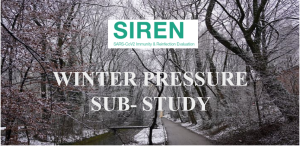By Desy Nuryunarsih on behalf of the SIREN (SARS-CoV-2 immunity and reinfection evaluation) Scotland Research Team*
Spring means a new start, but what does the year ahead hold in our SIREN study? It brings opportunities and challenges to our research. In the SIREN study, we are applying the depth of our transdisciplinary research and expertise to help understand the burden of respiratory infections on healthcare workers to inform UK government’s management of the COVID-19 pandemic. Over a million PCR tests and half of a million antibody tests have been undertaken by the UK Health Security Agency (UKHSA) SIREN study, and the study results have been used to guide workforce planning.
Globally, influenza cases were low in 2020 when the government imposed the lockdown, and in late 2021, there was a rebound in influenza cases [1]. In 2022 the situation was even more challenging, with NHS England recording an average of 1,939 daily flu cases in England’s hospitals in December 2022[2]. In the same month, the average number of daily absences caused by staff sickness in the NHS was 60,583 [2]. There was also concern that in the UK, there may be increased numbers of Respiratory syncytial virus (RSV) as cases normally increase in October each year, reaching a peak in December. This common virus can cause coughs and colds and is mostly mild, although it can be severe or fatal for higher-risk groups such as infants and the elderly [3, 4].
With the anticipation of a large number of cases of influenza in the winter 22-23, the SIREN Winter pressure sub-study went live on 28th November 2022. The Winter Pressure sub-study aims to investigate the incidence of influenza and RSV infection in healthcare workers, the effectiveness of the influenza vaccine, the incidence of co-infection between influenza and SARS-CoV-2, symptom variation between respiratory pathogens, as well as the number of sick days caused by respiratory viruses in healthcare workers.
SIREN is well placed to carry out this study as participants provide a swab every two weeks to test for SARS-CoV-2. This same swab can be used to test for influenza and RSV. There are 39 sites taking part in the sub-study across the UK; four of these are within Scotland.
This study will be crucial for the UK government and stakeholders, data on respiratory pathogens and answers to long-standing questions vital for workplace planning and safety within hospitals and the wider NHS.
Pictures retrieved from pixabay
*The Scottish SIREN Team past and present: Nicole Sergenson, Jennifer Bishop, Melanie Dembinsky, Laura Dobbie, Josie Evans, Lynne Haahr, Desy Nuryunarsih, Laura Naismith, Caitlin Plank, Lesley Price, Jenifer Weir, Ayodeji Matuluko, Desmond Areghan, Annelysse Jorgenson, Sally Stewart, Andrew Telfer, and Alexander Olaoye
References
- Lee, S.S., C. Viboud, and E. Petersen, Understanding the rebound of influenza in the post COVID-19 pandemic period holds important clues for epidemiology and control. Int J Infect Dis, 2022. 122: p. 1002-1004.
- NHS UK. Two thirds increase in hospital flu cases amid rising staff absences and pressure on NHS 111. NHS 75 England 2022 [cited 2023; Available from: https://www.england.nhs.uk/2022/12/two-thirds-increase-in-hospital-flu-cases-amid-rising-staff-absences-and-pressure-on-nhs-111/.
- GOV.UK, Respiratory syncytial virus (RSV): symptoms, transmission, prevention, treatment, U.H.S.A.U. activity, Editor. 2021, UK Health Security Agency: United Kingdom.
- UK Parliament. Respiratory syncytial virus and its impact on the NHS. 2022 2023]; Available from: https://lordslibrary.parliament.uk/respiratory-syncytial-virus-and-its-impact-on-the-nhs/.
